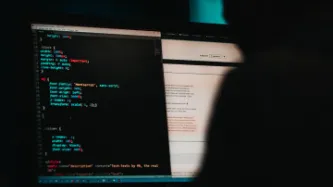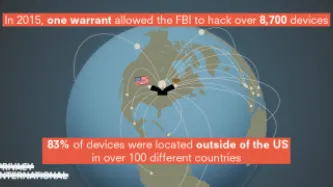Advanced Search
Content Type: Long Read
On 8 January 2021, the UK High Court issued a judgment in the case of Privacy International v. Investigatory Powers Tribunal. The Secretary of State for Foreign and Commonwealth Affairs and Government Communication Headquarters (GCHQ) appeared as interested parties to the case.
After our initial reaction, below we answer some of the main questions relating to the case.
NOTE: This post reflects our initial reaction to the judgment and may be updated.
What’s the ruling all about?
In…
Content Type: Frequently Asked Questions
On 8 January 2021, the UK High Court issued a judgment in the case of Privacy International v. Investigatory Powers Tribunal. The Secretary of State for Foreign and Commonwealth Affairs and Government Communication Headquarters (GCHQ) appeared as interested parties to the case.
After our initial reaction, below we answer some of the main questions relating to the case.
NOTE: This post reflects our initial reaction to the judgment and may be updated.
Content Type: News & Analysis
Today, the UK High Court has quashed a decision by the Investigatory Powers Tribunal (IPT) and held that section 5 of the Intelligence Services Act (ISA) 1994 does not permit the issue of general warrants to authorise property interference and certain forms of computer hacking.
The Court referred to cases dating back to the 18th century, which demonstrate the common law’s insistence that the Government cannot search private premises without lawful authority even in the national security…
Content Type: Press release
Today, the UK High Court has quashed a decision by the Investigatory Powers Tribunal (IPT), and ruled that section 5 of the Intelligence Services Act (ISA) 1994 does not permit the issuing of general warrants to authorise property interference and certain forms of computer hacking.
The Court referred to cases dating back to the 18th century, which demonstrate the common law’s insistence that the Government cannot search private premises without lawful authority even in the context of national…
Content Type: Press release
The case stems from a 2016 decision by the Investigatory Powers Tribunal (IPT), the UK tribunal tasked with examining complaints against the UK intelligence services, that the UK government could lawfully use sweeping ‘thematic warrants’ to engage in computer hacking of thousands or even millions of devices, without any approval by a judge or individualised reasonable grounds for suspicion. Thematic warrants are general warrants covering an entire class of property, persons or conduct, such as…
Content Type: Case Study
In early May 2019, it was revealed that a spyware, exploiting a vulnerability in Facebook’s WhatsApp messaging app, had been installed onto Android and iOS phones. The spyware could be used to turn on the camera and mic of the targeted phones and collect emails, messages, and location data. Citizen Lab, the organization that discovered the vulnerability, said that the spyware was being used to target journalists and human rights advocates in different countries around the world. The spyware…
Content Type: Long Read
Details of case:
R (on the application of Privacy International) (Appellant) v Investigatory Powers Tribunal and others (Respondents)
[2019] UKSC 22
15 May 2019
The judgment
What two questions was the Supreme Court asked to answer?
Whether section 67(8) of RIPA 2000 “ousts” the supervisory jurisdiction of the High Court to quash a judgment of the Investigatory Powers Tribunal for error of law?
Whether, and, if so, in accordance with what principles, Parliament may by…
Content Type: Press release
Today, after a five year battle with the UK government, Privacy International has won at the UK Supreme Court. The UK Supreme Court has ruled that the Investigatory Powers Tribunal’s (IPT) decisions are subject to judicial review in the High Court. The Supreme Court's judgment is a major endorsement and affirmation of the rule of law in the UK. The decision guarantees that when the IPT gets the law wrong, its mistakes can be corrected.
Key point:
UK Supreme Court rules that the UK spying…
Content Type: Long Read
As our four year battle against the UK government’s extraordinarily broad and intrusive hacking powers goes to the Supreme Court, we are launching a new fundraising appeal in partnership with CrowdJustice.
We are seeking to raise £5k towards our costs and need your help. If we lose, the court may order us to pay for the government’s very expensive army of lawyers. Any donation you make, large or small, will help us both pursue this important case and protect the future ability of…
Content Type: Press release
On 5 October 2017, Privacy International will appear before the UK Court of Appeal to continue its challenge to the British government's large scale hacking powers. The case questions the decision by the Investigatory Powers Tribunal (IPT) to sanction the UK government's power to hack broad categories of people or property without any individualised suspicion.
TIMELINE AND KEY POINTS
- Privacy International began fighting bulk government hacking in 2014 at the…
Content Type: Long Read
Introduction
A growing number of governments around the world are embracing hacking to facilitate their surveillance activities. Yet hacking presents unique and grave threats to our privacy and security. It is far more intrusive than any other surveillance technique, capable of accessing information sufficient to build a detailed profile of a person, as well as altering or deleting that information. At the same time, hacking not only undermines the security of targeted systems, but also has…
Content Type: Long Read
This piece originally appeared here.
On both sides of the Atlantic, we are witnessing the dramatic expansion of government hacking powers. In the United States, a proposed amendment to Rule 41 of the Federal Rules of Criminal Procedure would permit the government to obtain a warrant, in certain circumstances, to hack unspecified numbers of electronic devices anywhere in the world. Meanwhile, across the pond, the British Parliament is currently debating the Investigatory…
Content Type: Press release
Privacy International, the leading global privacy rights NGO, has today filed a Judicial Review at the UK High Court, challenging the Investigatory Powers Tribunal's (IPT) decision that the Government can issue general hacking warrants. This decision means that British intelligence agency GCHQ can continue to hack into the computers and phones of broad classes of people - including those residing in the UK. The Investigatory Powers Bill, currently being debated in Parliament, seeks to…







